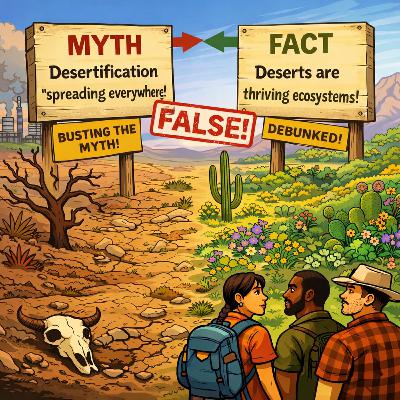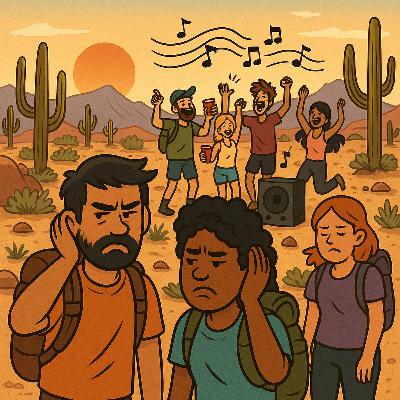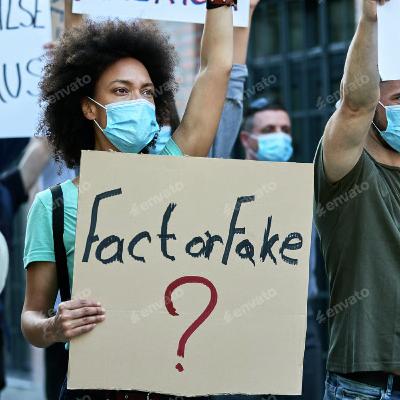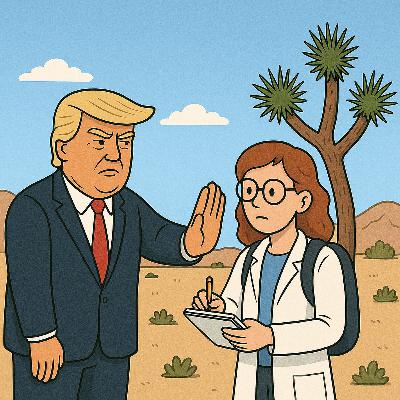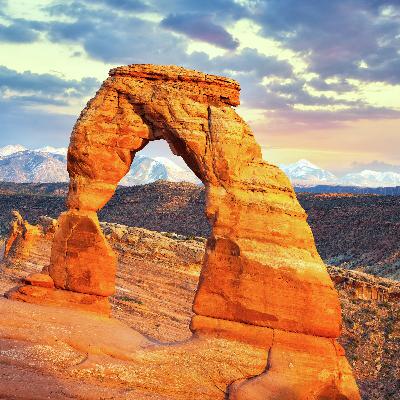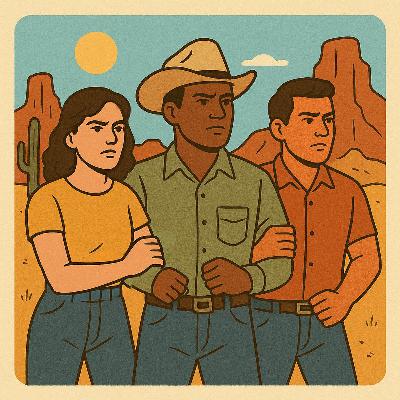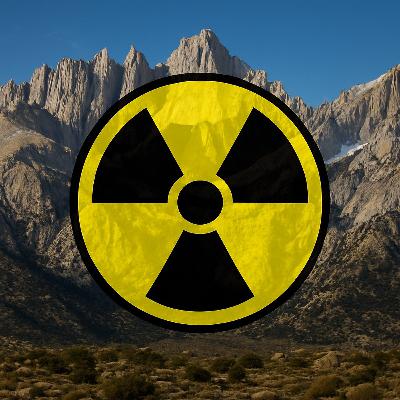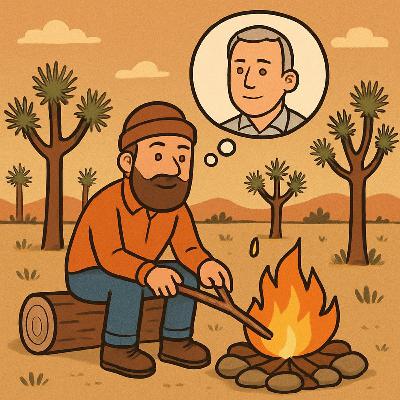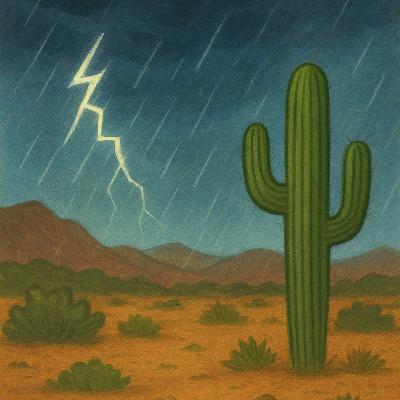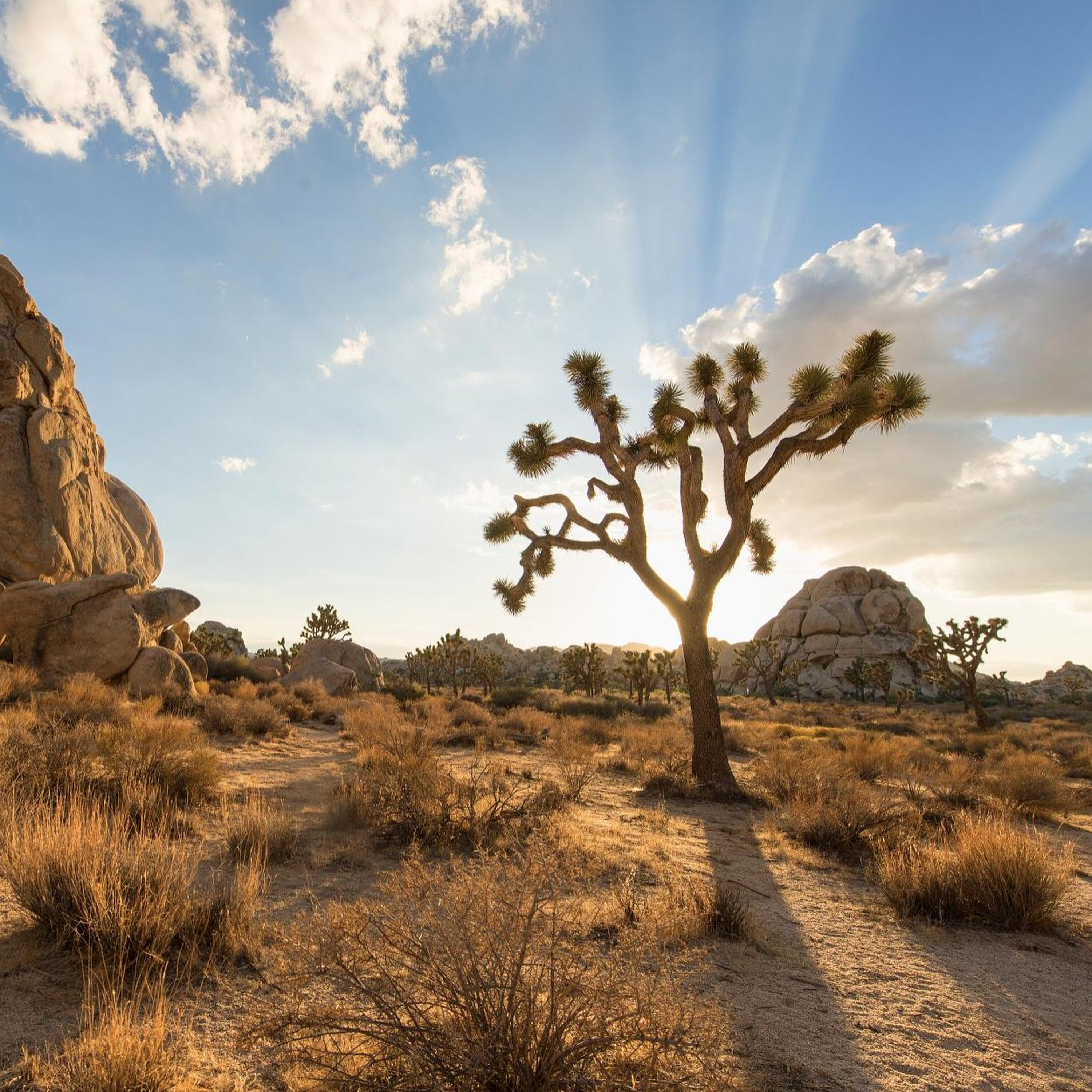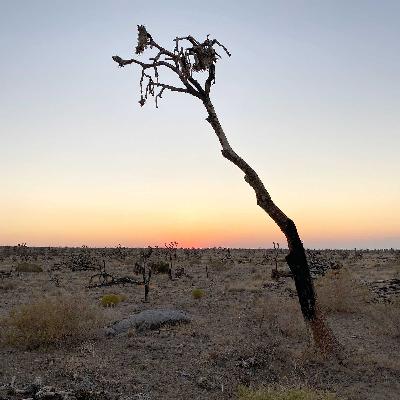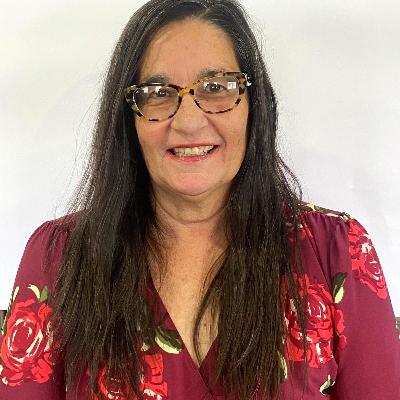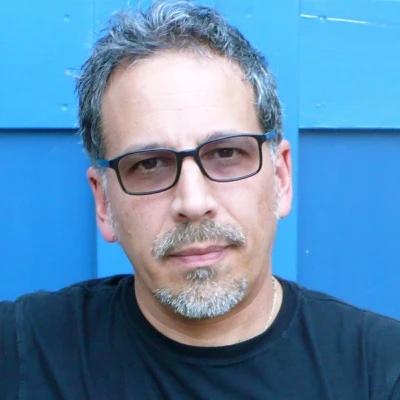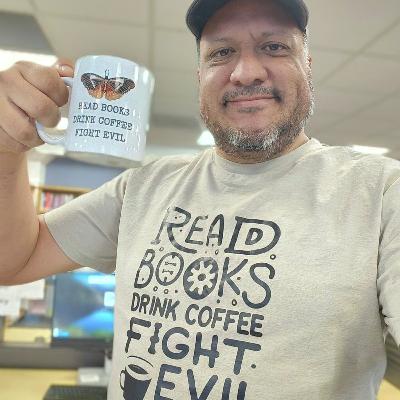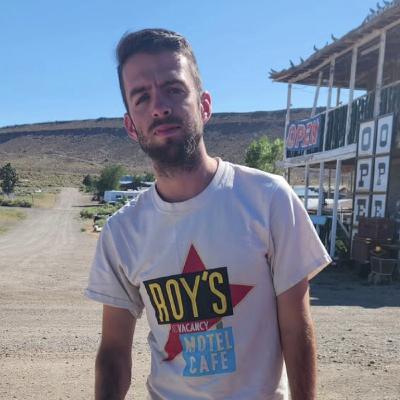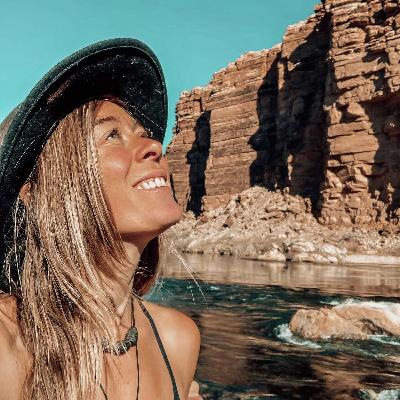Discover 90 Miles from Needles: the Desert Protection Podcast
90 Miles from Needles: the Desert Protection Podcast

 90 Miles from Needles: the Desert Protection Podcast
90 Miles from Needles: the Desert Protection Podcast
Author: Chris Clarke
Subscribed: 27Played: 855Subscribe
Share
© 2025 Desert Advocacy Media Network
Description
Join Chris Clarke and a variety of guests as they explore the challenges and opportunities of the American Southwest's fragile ecosystems. Engaging interviews with experts, activists, and advocates on conservation, land management, and environmental justice. Science and sentiment, politics and philosophy, hiking and history, culture and creativity all go into defending the desert. Be forewarned: We are out to recruit you to the cause.
127 Episodes
Reverse
In this thought-provoking episode of "90 Miles from Needles, the Desert Protection Podcast," host Chris Clarke embarks on a journey to unpack the concept of desertification and its implications for environmental policy. Engaging listeners with tales of ecological history and colonial narratives, Chris explores the intersection of science, politics, and public perception in shaping how we view and treat deserts. Through an insightful discussion backed by the work of geographer Diana K. Davis, he urges a rethinking of what constitutes land degradation and calls for a more nuanced understanding that respects the intrinsic value of dry lands. Chris challenges the prevailing notion that desertification equates to ecological failure and provides a critical examination of how historical and colonial assumptions have influenced modern conservation efforts. He highlights the importance of recognizing deserts as dynamic ecosystems shaped by natural processes and human impact. This episode is an eye-opener for those interested in land use policy, environmental advocacy, and the intricate relationship between culture and ecology. Key Takeaways: Desertification Misconceptions: Reframing desertification as land degradation challenges the stereotype of deserts as barren wastelands. Historical Context: The colonial roots of desertification persist, influencing how we address ecological challenges today. Policy Implications: Misnaming ecological processes can lead to ineffective conservation measures and exacerbate environmental issues. Respect for Deserts: Deserts require a holistic approach that values their ecological role and indigenous knowledge. Call to Action: June 17 could be a day to reimagine our relationship with deserts, focusing on protection rather than remediation. Notable Quotes: "Deserts aren't mistakes. They're not broken landscapes. They're ancient living systems shaped by scarcity and timing and restraint." "When you misname the problem, you reach for the wrong tools. And sometimes... those tools make things worse." "Deserts need us to listen to people who've lived with aridity for generations." "The story matters because your choice of story determines the solutions that are available to you." "Land can be damaged in dry places, but deserts themselves are not damage." Resources: Diana K. Davis' Works: Heavily referenced throughout the episode, particularly her book "The Arid Lands." Book Recommendation: "All the Wild and Lonely Places" by Larry Hogue. Podcast Website: 90 Miles from Needles Donation Link: Donate to the Podcast Become a desert defender!: https://90milesfromneedles.com/donateSee omnystudio.com/listener for privacy information.
Episode Summary: In this episode of "90 Miles from Needles: The Desert Protection Podcast," host Chris Clarke takes a moment to reflect on the challenges the desert has faced throughout the year. As 2026 looms with potential political upheavals, industrial intrusions, and environmental crises, he underscores the fragility and beauty of the North American deserts. Chris discusses the concept of desert quiet, a theme reflecting not only the absence of noise but the presence of life, and how human impact slowly erodes this natural soundscape. The show examines the consequences of noise pollution, highlighting the invisible wounds inflicted on the desert soundscape by human activities. Chris emphasizes the critical importance of listening to and preserving the desert's unique quiet and sound ecology. He shines a light on efforts by various advocates to protect these ecosystems and urges for increased support for the podcast to continue this vital work. As external pressures mount, the episode appeals to listeners and potential donors to contribute to the ongoing fight to conserve the desert, focusing on actionable ways to make a difference. Key Takeaways: The desert's soundscape is threatened by human-induced noise pollution, which can drive wildlife away and disrupt ecosystems. Observing and preserving the desert quiet is essential for maintaining the region's ecological health and vitality. Increasing public awareness and support is needed to preserve the desert’s unique ecosystems and prevent corporate exploitation. Contributions and engagement from listeners are crucial for continuing the podcast’s mission to protect the desert. Notable Quotes: "The desert has always been quiet, but I've been hearing a different kind of quiet." "We're living in a desert that is depauperate of the creatures that formed it." "Noise is one of the least recognized forms of pollution we create, and we create a lot of it." "When I stand in the stillness now, I listen for ghosts. Echoes of wings, vanished choruses, voices the desert used to carry." "If we want to keep the ones that remain or restore the ones that we still can restore, the first thing we have to do is listen." Resources: Visit our website: 90 Miles from Needles Support the podcast: Donate Page Follow on social media: Bluesky, Facebook, Instagram, Threads, Signal: hey90mfn.67 Listeners are encouraged to dive into the full episode for an engaging discussion on the importance of preserving desert environments and how we can all contribute to their protection. Stay tuned for more insightful episodes as the Desert Advocate Media Network continues to explore and advocate for these vital landscapes. Become a desert defender!: https://90milesfromneedles.com/donateSee omnystudio.com/listener for privacy information.
In this episode of the 90 Miles from Needles podcast, host Chris Clarke embarks on a detailed discussion with John Dougherty, Executive Director of Save the Scenic Santa Ritas Association, about the invasive copper mining initiatives threatening Arizona's sacred lands. Set against the backdrop of legal and environmental challenges, the conversation highlights the destructive potential of projects like the Copper World mine. With vibrant descriptions of Arizona's natural beauty juxtaposed with the stark reality of its exploitation for minerals, this episode paints an urgent call to action. Dougherty describes the controversial Copper World project, an expansion of the thwarted Rosemont Mine, spotlighting its predicted impact on local wildlife, sacred sites, and critical water resources. He explains the looming threats posed by massive open-pit mining and groundwater depletion. The discussion underscores the inadequacies and exploitation enabled by the General Mining Act of 1872, which allows mining companies to extract resources with minimal compensation to the public. Through strategic litigation efforts and community activism, Save the Scenic Santa Ritas aims to address and potentially halt these harmful mining activities. Key Takeaways: Save the Scenic Santa Ritas Association is actively opposing the Copper World mine to prevent environmental and cultural devastation in the Santa Rita Mountains. The Copper World project threatens sacred indigenous lands and critical water resources in Arizona, fostering ecological and community concerns. Arizona's legal framework, based on the General Mining Act of 1872, is scrutinized for its outdated policies favoring mining corporations without adequate environmental oversight or economic benefit to the community. The podcast underscores the importance of local and political action to combat environmental degradation and protect public lands from corporate exploitation. Dougherty advocates for grassroots support and encourages listeners to engage with local governance to enact restrictive policies on destructive mining activities. Notable Quotes: "If space aliens arrived with an orbital death ray and erased a valley in just this fashion, the nations of the world would go to war." "The damage doesn't just stop when the mining stops, the damage continues on forever." "The Ray Mine isn't the largest open pit copper mine in the state, but...it was about as stark and unexpected as I had ever seen." "This copper is going overseas...the company admits in its financial filings that the first four or five years will all be exported." Resources: Save the Scenic Santa Ritas Association: Website Contact Information for Arizona Government Officials: Reach out to Arizona's Governor Katie Hobbs at engage@az.gov and State Attorney General Kris Mays (https://www.azag.gov/to advocate for changes in mining regulation policies to protect Arizona's lands. Become a desert defender!: https://90milesfromneedles.com/donateSee omnystudio.com/listener for privacy information.
In this compelling episode of 90 Miles from Needles, host Chris Clarke explores the delicate balance of truth in natural environments and everyday life. With a focus on the impact of modern technology, Chris explores how misinformation, notably from AI-generated content, can distort our understanding of the natural world. He raises vital questions about the integrity of information and prompts listeners to reconsider how we consume media. This discussion extends to an examination of the timeless truths found within desert ecosystems, where reality remains unobscured by human interference. Chris eloquently contrasts the external world filled with "little lies" and the undeniable truths present in the desert's harsh yet honest environment. This episode emphasizes the importance of discernment in the digital age, encouraging listeners to seek authenticity and treasure the unembellished truth of natural landscapes. Key Takeaways: AI-generated content is increasingly sophisticated, making it challenging to distinguish between reality and fiction. Deserts serve as natural educators, offering unbiased truths and teaching resilience, adaptation, and harmony. Misinformation isn't limited to one side of the political spectrum; all individuals must critically assess their beliefs. The desert's inherent truthfulness contrasts with the often manipulated realities we encounter through media and politics. Understanding natural environments, like deserts, requires slowing down and embracing complexity without preconceptions. Notable Quotes: "The desert is pretty honest about limits." "When does an untruth become a lie? A lie requires intent." "The desert is pretty firm in its stance that reality is not optional." "Truth in the desert is slow, and if you want to catch it, you slow down, too." "The desert never asks us to pick one story or the other. It just presents the facts in all their complexity." Resources: Coyote and Badger video: https://www.youtube.com/watch?v=2bICTWNRrGE Engage further with this insightful podcast episode to explore the interplay between environmental truth and societal narratives. Stay tuned for more episodes of 90 Miles from Needles, where the focus remains steadfastly on desert protection and the stories that shape our understanding of these vital ecosystems. Become a desert defender!: https://90milesfromneedles.com/donateSee omnystudio.com/listener for privacy information.
In this compelling episode of 90 Miles from Needles, host Chris Clarke engages in a deep conversation with Nick Graver as they explore the pressing challenges facing Joshua Trees and desert conservation efforts amid climate change and governmental policy swings. Recorded during the longest federal government shutdown in U.S. history, this episode highlights the hurdles that scientists and conservationists face in protecting vulnerable species against the backdrop of political instability. The discussion spotlights key topics such as the impact of invasive species on desert ecosystems, the critical role of the Joshua Tree as a keystone species, and how recent wildfire patterns threaten these iconic symbols of the desert. Graver elaborates on the intricate science behind population modeling and stresses the urgency of coordinated governmental and scientific efforts to preserve these fragile landscapes. As federal support becomes erratic, this episode captures the essence of modern environmental advocacy and the relentless pursuit of conservation in uncertain times. Key Takeaways: The Joshua Tree faces significant threats from climate change, especially due to invasive grasses and increased occurrences of human-caused wildfires. There is a pressing need for diverse partnerships between governmental bodies, researchers, and indigenous communities to develop effective conservation strategies. Federal and state policy dynamics, including the effects of government shutdowns, severely impact the implementation of conservation efforts. Understanding the life history and reproductive patterns of Joshua Trees provides crucial insights for developing long-term conservation measures. Despite political barriers, continuous advocacy and research are critical to ensuring the survival of Joshua Trees and the broader desert ecosystem. Notable Quotes: "We've known for 15 or 20 years now that Joshua Trees in particular were threatened by climate change." "If there's nobody there to hear those ideas and implement those changes, then it's all pointless." "Joshua Trees occupy a substantial area in four U.S. states... and is a critically important species." "The trees that we plant in 2025... by the time that those trees grow to adulthood, it will already be 2070." Resources: 90 Miles from Needles Website Burton Frasher's 1926 photo of the "U2 Joshua Tree" 1980 shot of the same tree For a deeper understanding of the current state of desert conservation and the challenges faced by Joshua Trees, listen to the full episode. Become a desert defender!: https://90milesfromneedles.com/donateSee omnystudio.com/listener for privacy information.
About the Guest: Andrea Hoerr is a committed environmental advocate working with Save the Scenic Santa Ritas and Great Old Broads for Wilderness in Tucson, Arizona. Her work involves fighting against environmentally detrimental projects, such as huge mining operations and the development of border walls in biodiverse regions. Andrea, also known as Dre, uses her expertise as an Arizona Master Naturalist to engage in preserving wilderness areas and fostering grassroots efforts for environmental conservation. Episode Summary: In this episode of "90 Miles from Needles: The Desert Protection Podcast," host Chris Clarke engages with Andrea Hoerr, a fervent activist for desert conservation and biodiversity protection. Hoerr highlights the ecological threats posed by the potential construction of a 27-mile border wall through the San Rafael Valley in Southern Arizona. The episode covers the rich biodiversity of the region, including its status as a biodiversity hotspot and migration corridor for a variety of species. The conversation dives deep into the importance of the San Rafael Valley's grasslands, shedding light on the impending consequences of border wall construction, such as disrupted animal migration, waterway destruction, and habitat fragmentation. Hoerr underscores the collective resistance against these developments and invites listeners to a peaceful rally on November 15 aimed at raising awareness and protecting the valley. By presenting comprehensive anecdotes and first-hand experiences, this episode serves as a powerful call to action for greater environmental advocacy. Key Takeaways: The San Rafael Valley in Southern Arizona is a critical biodiversity hotspot, threatened by a proposed 27-mile border wall. Andrea Hoerr and her fellow activists are organizing a rally on November 15th to raise awareness about the ecological impacts of the border wall. The proposed wall will disrupt animal migration corridors, hamper natural waterways, and result in habitat fragmentation. Biodiversity is vital not only to the environment but also to national security, as recognized by various institutions, including the military. Engaging with and bearing witness to the land helps solidify community commitment to environmental conservation efforts. Notable Quotes: "Biodiversity is important to the health and well-being of not only humans, but all the 10 million species that are interconnected." "We acted as if we can do whatever we want without any concern for the repercussions." "You cannot really grasp the magnitude of what's happening here until you get there, until you bear witness for yourself." "Art, as you know, is such an important way to reach people." "We choose to try not to paint everyone with a broad brush. There’s a lot more hearts and minds that can be won over." Resources: Save the Scenic Santa Ritas Great Old Broads for Wilderness Instagram: Rally for the Valley Andrea Hoerr on Bluesky Website: Border Wall Resistance Tune in to the full episode for an inspiring and detailed exploration of the San Rafael Valley, its invaluable ecology, and the community efforts to protect it. Stay connected for more stories and insights from "90 Miles from Needles: The Desert Protection Podcast." Podcast episode artwork courtesy Sky Island Alliance. Become a desert defender!: https://90milesfromneedles.com/donateSee omnystudio.com/listener for privacy information.
Episode Summary: In this episode of "90 Miles from Needles: The Desert Protection Podcast," host Chris Clarke takes listeners into the complex worlds of wildlife policy and desert preservation. The episode features Mandy Culbertson, Communications Director at Wildlife for All, discussing the implications of state and federal-level wildlife governance on biodiversity and the environment, particularly within the Southwest's desert landscapes. She explains how Wildlife for All is working to reform state wildlife governance by including more democratic processes and scientific approaches to benefit ecosystems and wildlife populations. Mandy provides an insightful analysis of the current state of wildlife management in the Southwest and beyond, highlighting the disparity in effectiveness among different states. With a critical eye on states like Arizona and Montana, Chris and Mandy discuss pressing issues such as the militarization of the US-Mexico border and its detrimental effects on wildlife. Mandy elaborates on how public pressure can influence policy decisions, citing recent victories and ongoing struggles in wildlife advocacy. The conversation also highlights the crippling impact of the recent federal government shutdown on wildlife protection efforts, especially for endangered species like the Mexican gray wolf. Key Takeaways: Wildlife for All's Mission: The organization focuses on transforming state wildlife governance to protect biodiversity and strengthen ecosystems with an ethical and democratic approach. Southwestern Biodiversity: The American Southwest is a biodiversity hotspot facing unique challenges such as habitat fragmentation, climate change, and urban development pressures. State Wildlife Management: States like Arizona exhibit problematic wildlife management practices, often putting political ideology and special interests over scientific and ethical considerations. Impact of Border Militarization: Increased infrastructure and enforcement along the US-Mexico border significantly disrupt wildlife corridors, affecting numerous species. Federal and State Dynamics: The federal government shutdown exacerbates challenges in managing and protecting wildlife. Notable Quotes: "Most folks don't realize that state agencies, state wildlife agencies, are responsible for the vast majority of wildlife management in this country." — Mandy Culbertson "Protecting biodiversity and restoring healthy ecosystems requires a more ethical and democratic and just approach to wildlife policy." — Mandy Culbertson "The war on wildlife isn't separate from the crisis of democracy that we're seeing right now. It's a symptom of the same disease." — Mandy Culbertson "Public pressure matters. These state wildlife commission meetings are a great place to get involved." — Mandy Culbertson Resources: Wildlife for All Website: https://wildlifeforall.us Wildlife For All's Wildlife Advocacy Toolkit: https://wildlifeforall.us/take-action/advocacy-toolkit/ Wildlife For All also compiles a regular list of state wildlife commission meetings: https://wildlifeforall.us/october-wildlife-commission-meetings/ No Kings Movement: https://nokings.org Permission to Pollute Act (bill text): https://www.congress.gov/bill/119th-congress/house-bill/3898/text Public Lands Rule Public Comment (ends November 10): Engage in the ongoing public comment to help keep non-consumptive use of public lands (like hiking, camping, wildlife watching) on an equal policy footing with mining and logging. For more info: https://www.doi.gov/pressreleases/interior-proposes-rescind-public-lands-rule-restoring-balanced-multiple-use Become a desert defender!: https://90milesfromneedles.com/donateSee omnystudio.com/listener for privacy information.
In this episode of "90 Miles from Needles," host Chris Clarke provides valuable insights into the impact of government shutdowns on national parks, especially those within desert regions. The episode opens with a beautiful recording of a hermit thrush by nature sound artist Fred Bell, setting a serene and reflective tone for discussing the challenges facing these national treasures during shutdowns. Clarke advises listeners to reconsider visiting national parks until they are fully operational again due to the strain on park staff and resources, leading to potential environmental degradation and safety risks. Chris shares insights from retired park rangers and discusses the alarming consequences of a strained park system, such as vandalism, inadequate maintenance of amenities, and risks posed by decreased ranger presence. Clarke also emphasizes the economic implications for local communities reliant on park tourism, highlighting examples of local businesses adapting by offering alternative tours outside national parks. Additionally, he encourages listeners to explore other natural and historical sites managed by different entities, thus somewhat preserving the economic stability of local regions while respecting and protecting national parks during these challenging times. Key Takeaways: National parks face significant challenges during government shutdowns, leading to environmental and safety risks. Vandalism, lack of maintenance, and potential visitor accidents are heightened without adequate park staffing. Retired park rangers advocate for closing parks entirely during shutdowns to protect resources. Local businesses and tour operators offer alternative experiences outside national parks to mitigate economic impacts. Visitors can explore nearby state parks, county parks, and BLM lands as responsible alternatives. Notable Quotes: "As someone who lives a five minute drive from an extremely popular national park, it's disturbing to me that the Secretary of the Interior has basically ordered parks to stay as open as possible during the shutdown." - Chris Clarke "These landscapes, these cultural resources, these historical resources are all vulnerable. And right now they don't have enough guardians watching over them." - Chris Clarke "During the last long shutdown, there was vandalism in Joshua Tree. There's spray painting on rocks, damage and theft of artifacts and cultural items." - Chris Clarke "We can use it as an excuse to give those animals another break. It's been five years since they had one. Maybe we think about this as a good moment to give the land and the beings that live there another chance to breathe." - Chris Clarke "The landscapes around the parks are amazing in their own right, and your spending there will still support the local economy without adding pressure to the national parks." - Chris Clarke Resources: 90 Miles from Needles Podcast: [90milesfromneedles.com](https://90milesfromneedles.com) Desert Protection Podcast Social Media: Facebook https://facebook.com/ninetymilesfromneedles Instagram https://www.instagram.com/90mifromneedles/BlueSky https://bsky.app/profile/90milesfromneedles.comThreads https://www.threads.com/@90mifromneedles Become a desert defender!: https://90milesfromneedles.com/donateSee omnystudio.com/listener for privacy information.
Host Chris Clarke takes listeners along on a recent journey to El Paso for the Chihuahuan Desert Fiesta. The trip was made possible by supporters who contributed to the Chihuahuan Desert Travel Fund. Clarke shares insights and experiences from traveling over 1600 miles across the deserts of the Southwest. This episode provides a heartfelt thank you to supporters and explores the challenges facing desert conservation. As Clarke reflects on the journey, he explores common ecological threats facing desert regions, ranging from industrial development to climate change and invasive species. The episode features stories and experiences gathered from Tucson to El Paso, highlighting the bond people form with these arid landscapes and the innovative ways communities are working to protect them. Clarke concludes by discussing the potential for a cross-desert conservation movement, emphasizing the importance of collaboration and communication. Key Takeaways: The Chihuahuan Desert Fiesta provided a platform for connecting with desert conservationists and highlighted the biodiversity and challenges unique to desert ecosystems. The trip was a success thanks to generous donations, enabling Clarke to engage with local communities and build relationships that transcend geographic boundaries. Ecological threats, such as invasive species and climate change, affect all desert regions, necessitating collaborative conservation efforts. Personal connections and face-to-face interactions can be pivotal in galvanizing support and fostering shared passion for desert protection. The idea of a continent-wide desert conservation movement underscores the need for innovative communication channels between diverse communities. Notable Quotes: "The ecosystems are fragile in the sense that they are slow to heal from disturbance. They can take centuries to recover." "There is a diverse group of people working on protecting the deserts... that care about the desert and want to protect it." "I think the thing that I was most impressed by from mile one of this trip is the degree of passion that these places raise in their defenders." "It would be great for people in Las Vegas to be familiar with what people in El Paso are facing and vice versa." Resources: 90 Miles from Needles https://90milesfromneedles.com The Mojave Project: https://mojaveproject.org/ Adriana Bachmann - https://www.instagram.com/myclimateclarity Eli Heller - https://www.instagram.com/desertnaturalist Henry Brean at AZ Daily Star: https://tucson.com/users/profile/henry%20brean/ Become a desert defender!: https://90milesfromneedles.com/donateSee omnystudio.com/listener for privacy information.
Episode Summary In this eye-opening episode of *90 Miles from Needles*, host Chris Clarke welcomes back Dr. Michael E. Ketterer to explore the unsettling connections between historical nuclear testing in the Nevada Test Site and fallout in unexpected areas like eastern California. With cutting-edge mass spectrometry, Dr. Ketterer reveals how nuclear tests conducted decades ago may have risked public health in unexpected places such as eastern California. The episode not only dives deep into the legacy of nuclear testing but also highlights the need for further investigation into its repercussions, particularly in underrepresented areas impacted by radioactive exposure. During the conversation, Dr. Ketterer shares his findings on how eastern California, particularly the regions around Mount Whitney, has been affected by nuclear fallout in levels comparable to notorious downwind zones like St. George, Utah. He asserts that existing compensation programs, like the Radiation Exposure Compensation Act (RICA), should be expanded to include these overlooked areas. Dr. Ketterer also discusses his involvement in a mobile lab initiative that aims to map fallout across New Mexico—providing crucial data to better understand past exposures and advocate for affected communities. Key Takeaways Dr. Ketterer exhibits compelling evidence that nuclear fallout from Nevada test sites reached eastern California in significant amounts, equivalent to recognized downwind fallout areas. The episode challenges preconceived notions about nuclear test fallout only affecting designated downwind areas and calls for policy expansion to acknowledge overlooked regions. The pursuit of truth in fallout mapping is driven by sophisticated isotopic testing, identifying residual contamination in soil samples and informing future legislative action. Dr. Ketterer's work shines a light on neglected communities, emphasizing the importance of validating historical data for revising compensation and care strategies under RECA. A new mobile lab initiative, designed to bring testing capabilities directly to communities, is part of Dr. Ketterer’s latest efforts to empower citizens with real-time data and insights into their environmental health. Resources Veterans for Peace https://www.veteransforpeace.org/ Learn about plutonium isotopic fingerprinting techniques: https://en.wikipedia.org/wiki/Isotopic_signature Research articles and public work by Dr. Michael Ketterer can be found through Google Scholar. Listen to the full episode for an in-depth understanding of how fallout from historical nuclear testing impacts communities today and gain insights into the ongoing efforts to map and mitigate these effects. Don't miss upcoming episodes for more on desert protection and advocacy initiatives!Become a desert defender!: https://90milesfromneedles.com/donateSee omnystudio.com/listener for privacy information.
Chris Clarke discusses the political tensions boiling over in the U.S., particularly surrounding the assassination of Charlie Kirk. Clarke offers a profound exploration into the implications of this event on the left-wing movement while criticizing the portrayal of the desert, advocating for the urgent need to protect these delicate ecosystems. As a long-time activist, Chris emphasizes the significance of non-violence in political change and the dangers of one-sided media narratives. Throughout the episode, Chris Clarke adeptly interweaves his rich history of activism with an analysis of current political events, spotlighting the Desert Advocacy Media Network's role in environmental advocacy. He engages listeners by addressing the resurgence of political urgency reminiscent of past decades while accentuating the necessity to expand the podcast's reach for greater impact. Resources and alternatives are suggested for diversifying how audience members can contribute, whether financially or through spreading awareness. Key Takeaways: Host Chris Clarke provides an insightful commentary on the assassination of Charlie Kirk, highlighting the misguidedness of political violence as a means of change. Chris invites listeners to support the "90 Miles from Needles" podcast, stressing the value of community-driven initiatives over corporate media. Listeners are encouraged to engage with small media projects as paramount sources for truthful reporting in light of biased mainstream narratives. Clarke calls for solidarity among desert inhabitants of all backgrounds, urging collaboration to safeguard their way of life. Notable Quotes: "I was involved in sitting in administration buildings in protest... It was all very new and exciting, and I had no perspective back then." "There are probably circumstances in which I would decide people are justified in using some violence to defend themselves... But we are not there in a mass political sense in the US." "It's people on the right that need to start professing their opposition to political violence. Because on the left, our record is pretty clear." "The task of revealing what's going on in this country is necessarily falling to us because Paramount and Comcast and Disney and Apple and Netflix and Google and Meta don't have the slightest interest in informing us at this point." "We are all desert people, and we need to stand up for each other." Resources: 90 Miles from Needles website: https://90milesfromneedles.com Contact for donations: https://90milesfromneedles.com/donate Department of Justice report on domestic extremism: Available at https://90milesfromneedles.com/extremism Listeners are encouraged to tune into this episode for an in-depth understanding of current political dynamics and to support the "90 Miles from Needles" podcast for continued advocacy towards desert protection and truthful reporting. Stay engaged for more enlightening and thought-provoking content from Chris Clarke and his guests.Become a desert defender!: https://90milesfromneedles.com/donateSee omnystudio.com/listener for privacy information.
Chris Clarke, the host of "90 Miles from Needles: The Desert Protection Podcast" is a seasoned storyteller, passionate environmentalist, and a desert aficionado. Throughout his career, he has dedicated himself to the protection of desert ecosystems through his writings, activism, and this podcast. Chris's work often intersects with emotional narratives tied to family, nature, and the unique beauty of desert landscapes. Episode Summary: In this heartwarming episode of "90 Miles from Needles," host Chris Clarke relates poignant memories of his first encounter with the North American deserts alongside his father, James Clarke, who recently turned 91. The podcast blends reflections on family ties with the enchanting life cycles of the desert's flora and fauna, particularly focusing on the coastal dynamics of Joshua trees and their pollinators, the Joshua tree moths. Chris's narrative paints a vivid picture of his desert journeys, interwoven with the deeply personal legacy imparted by his father. Listeners are treated to rich, descriptive storytelling about the Mojave Desert's changing landscape due to 2005's unprecedented rain, revealing a lush tapestry of growth and bloom. Throughout the episode, Chris explores the intricate dance of mutual dependence between Joshua trees and moths, using this symbiosis as a metaphor for family relations. His reflections span generations, touching on areas like evolution, kinship, and the broader cycles of nature. The episode closes with details about upcoming events and heartfelt gratitude to contributors who support Chris’s mission of desert conservation. Key Takeaways: Chris recollects his initial desert experience from 60 years ago, imparting a deep-seated love for this landscape gifted by his father. The episode highlights the symbiotic relationship between Joshua trees and their exclusive pollinators, the Joshua tree moths. Personal narratives are woven with scientific insights into desert ecosystems, emphasizing the interconnectedness of all life forms. Chris shares details of the Chihuahuan Desert travel plans for community engagement and draws attention to ongoing activism for desert protection. A touching celebration of familial bonds is tied to the broader theme of inheritance and nature's ongoing legacy. Notable Quotes: "It shaped my life. And the guy that was behind the wheel driving me and some others around in the desert that month in 1966…" "Building a good fire is a matter of balance… and I think about my father." "It's the family I've always longed for, and I cherish my place in it." "We are related. We are kin." Resources: Visit 90milesfromneedles.com for more details about upcoming events. For contributions to the Chihuahuan Desert Travel Fund, go to 90milesfromneedles.com/elpaso.Become a desert defender!: https://90milesfromneedles.com/donateSee omnystudio.com/listener for privacy information.
Episode Summary This episode of the "90 Miles from Needles" podcast does a racing dive into the fascinating topic of monsoonal rainstorms in the desert, focusing on their effects and significance. With detailed insights into recent rain events in Twentynine Palms, California, Chris shares the challenges and celebrations that accompany these powerful meteorological phenomena. Amid the backdrop of a biome shaped by water scarcity, the podcast explores both the danger and the necessity of monsoon rains, sparking reflections on desert life and conservation. Clarke elaborates on how water, despite its scarcity, is the primary sculptor of desert landscapes and essential for the survival of unique flora and fauna. He details the local impact of monsoonal rains on infrastructure and wildlife, emphasizing the importance of respecting and preparing for these natural events. Key Takeaways: Monsoonal rainstorms are pivotal in shaping and maintaining the unique ecosystems of deserts. Deserts are defined by their lack of water, with meteorological events like monsoons highlighting the delicate balance between scarcity and abundance in these environments. Human safety during monsoonal rains is paramount, as flash floods pose a significant risk to life and property, underscoring the importance of mindful interaction with desert landscapes. An engaging description of the scent of wet creosote after a monsoon provides a sensory glimpse into the captivating transformations brought about by these rainstorms. Environmental advocacy and awareness are crucial for protecting desert ecosystems from threats and promoting sustainable interactions with these fragile areas. Notable Quotes: "Monsoons are a reminder that the best days in the desert are full of passionate intensity, while the worst lack all convection." "For every thousand people celebrating a monsoon, one person gets really badly damaged, sometimes through no fault of their own." "When the monsoon comes, it's hard not to celebrate." "Water is like currency in the desert. It's scarce, and therefore, it's valuable." "Desert varnish and playa, even the visual symbol of how deserts are dry, got there because there used to be water there." Resources: "90 Miles from Needles" Podcast Website: 90milesfromneedles.com National Weather Service for weather tracking and forecasts: https://www.weather.gov/ Chihuahuan Desert Fiesta event details for the El Paso Zoo https://chihuahuandesert.org/fiesta-information/ Become a desert defender!: https://90milesfromneedles.com/donateSee omnystudio.com/listener for privacy information.
In this episode of "90 Miles from Needles: The Desert Protection Podcast," host Chris Clarke dives into recent legislative developments surrounding the protection of the iconic Western Joshua Tree in California. The conversation highlights the intricacies of conservation laws, the intricate process of implementing these policies, and the pushback from various stakeholders navigating this environmental directive. The discussion is enriched with insights from returning guest Brendan Cummings of the Center for Biological Diversity, who shares his expertise on species protection under the California Endangered Species Act. The episode provides a comprehensive update on the California Fish and Game Commission's approval of the Western Joshua Tree Conservation Plan. This plan is required by the Western Joshua Tree Conservation Act passed in 2023, seeking to protect Joshua trees threatened by climate change, development, and wildfires. Cummings, who was pivotal in initiating the process by petitioning to protect the Western Joshua Tree in 2019, offers an in-depth exploration of the process, the challenges faced, and the compromise built into the legislation. Listeners are encouraged to stay tuned for the episode's conclusion, featuring the moving song "Joshua Tree" by Melanie Marshall, which thematically underscores the significance of preserving this desert species. Key Takeaways: Western Joshua Tree Conservation Act: The act passed in 2023 addresses climate change threats and simplifies permits for relocating or removing Joshua Trees, aiming for the species' long-term survival by 2033. Collaboration and Compromise: The passing of protections involved compromise between environmentalists and industries, balanced by setting more straightforward processes for developers and prioritizing protection through coordinated conservational efforts. Adapting to Climate Threats: The Conservation Plan identifies climate threats, prioritizing refugia and high-elevation areas for sustained Joshua Tree populations, with a focus on reducing invasive species and fire risks. Community and Tribal Involvement: Engagement with local governments and Native American tribes plays a significant role in implementing conservation methods, highlighting cultural ties to the land and species. Future Directions: By 2033, effectiveness will be reassessed, potentially reconsidering the species' threataned status if current measures do not mitigate the threats effectively. Notable Quotes: Brendan Cummings: "The Western Joshua Tree Conservation act signed into law in July 2023 was the first state law by California that recognized the climate threat to biodiversity." Brendan Cummings: "The goal was to protect the species and to ensure Joshua trees continue to be a part of our desert communities." Brendan Cummings: "The overriding threat, of course, is climate change. We also have increased fires fueled by invasive grasses, and then the most immediate threat, which is Joshua trees getting chopped down." Robert Gomez: "I want to look at the cultural aspect of the Joshua Tree for our particular tribe… It means a lot to us." Brendan Cummings: "We can hopefully figure out how to reduce the impacts or frequency of fire in Joshua tree habitat, but we're not going to stop it." Resources: Center for Biological Diversity: https://www.biologicaldiversity.org/ California Department of Fish and Wildlife: https://wildlife.ca.gov/Conservation/Environmental-Review/WJT/WJTCA Melanie Marshall's Music: https://soundcloud.com/melaniemarshallmusicBecome a desert defender!: https://90milesfromneedles.com/donateSee omnystudio.com/listener for privacy information.
Host Chris Clarke delves into the profound impact of the Dome Fire on the cherished Joshua Tree forest within the Mojave National Preserve. Marking the five-year anniversary of the Dome Fire, Clarke reflects on personal experiences and the broader ecological ramifications. The devastating event shifted his life, carving a definitive "before" and "after" in his approach to desert protection. Listeners are taken on an emotional journey through the charred landscape of Cima Dome, providing striking narratives about recovery efforts and the ongoing challenges posed by invasive species like cheatgrass and red brome. Clarke's introspection includes insights from Cima Dome experts like Drew Kaiser and Debra Hughson. They highlight both the devastation wrought by the Dome Fire and the collaborative restoration efforts underway. The episode serves as both a sobering reminder of what has been lost and a hopeful testament to resilience in the face of environmental upheaval. Key Takeaways: The Dome Fire of 2020 dramatically altered the landscape of the Joshua tree forest, marking a pivotal moment of change for environmental activists like Chris Clarke. Restorative efforts in the Mojave National Preserve highlight the complexities of ecosystem recovery, facing challenges from invasive species such as red brome and cheatgrass. Personal and ecological narratives intertwine as Clarke discusses the grief of environmental loss and the slow process of healing for the affected landscapes. The episode underscores the importance of maintaining awareness of environmental destruction while finding hope and actionable paths for positive change. Clarke explores the idea of "solastalgia," feeling deep nostalgia and loss for a place he once knew as both an environmentalist and a deeply connected individual. Notable Quotes: "Every time I come back here, it looks worse. The memories of how it used to be become more clear and more ever present in my mind." "I feel as if I'm visiting someone that I have loved for a long time in hospice after all of their brain activity has ended." "When I die, I want to be burned to ash and I want the people that love me to bring those ashes here." "My being around to see it, if you take that literally, is a choice on my part. And I'm not sure why I keep coming back." Resources: 90 Miles From Needles Podcast website: https://www.90milesfromneedles.com/ Mojave National Preserve web page on the Dome Fire: https://www.nps.gov/moja/learn/nature/dome-fire.htm DAMN Chihuahuan Desert Travel Fund: https://90milesfromneedles.com/elpaso Become a desert defender!: https://90milesfromneedles.com/donateSee omnystudio.com/listener for privacy information.
This episode, celebrated over several parts to accommodate in-depth discussions, features a captivating final chapter with Ruth Nolan. A distinguished voice in desert poetry and a former wildland firefighter, Ruth shares her insights into the ecological challenges and intrinsic beauty of California's deserts through her evocative poetry, with themes of renewable energy impacts, wildfires, and invasive species. Through readings from her works such as "Ruby Mountain" and "After the Dome Fire," Ruth Nolan paints a vivid picture of the Mojave Desert's poignant struggles and enduring spirit. She invites us to reflect on the necessity of environmental vigilance and collective action through the memories of her firefighting days, close calls with nature, and poetic musings on desert life. The narrative threads courage, resilience, and reflection into a poetic tapestry that speaks to both the heart and the mind, underscoring the urgency of conservation efforts in the face of modern challenges. Key Takeaways: Ruth Nolan emphasizes the blend of past experiences and contemporary challenges in the struggle to protect the desert, alongside her literary contributions. The readings from Ruth's works highlight themes of environmental impact due to renewable energy projects and the cultural significance of desert landscapes. The episode celebrates the collaboration of activists, journalists, and writers engaging in the dialogue on desert preservation. The interconnectedness of art, activism, and environment is a recurring theme, urging listeners to witness both poetic and practical advocacy for desert protection. Notable Quotes: "I saw three golden eagles on the morning of an all-night mourning ceremony..." – Ruth Nolan"This is how you put out a fire before it has a chance to erupt into something big." – Ruth Nolan"We did this to ourselves, people. And we keep doing it again and again and not again." – Ruth Nolan"Look for the small things. A wisp of sultry smoke... This is where it will stop." – Ruth Nolan"We have to love it. But we also know there's a lot of darkness." – Ruth Nolan Resources: "Ruby Mountain" by Ruth Nolan"No Place for a Puritan: The Literature of California's Deserts""Fire and Rain: Eco Poetry of California"Become a desert defender!: https://90milesfromneedles.com/donateSee omnystudio.com/listener for privacy information.
In this chapter of the milestone hundredth episode of the "90 Miles from Needles: The Desert Protection Podcast," host Chris Clarke introduces a rich tapestry of insights from renowned desert advocate and writer Ruben Martinez. The chapter, part of a comprehensive six-part series celebrating this landmark with diverse contributors, invites listeners into a profound discussion linking deserts not only as geographical landscapes but as symbols of spiritual and existential exploration. Martinez shares an evocative narrative that intertwines personal experiences in the stark wilderness with broader socio-political and spiritual themes. Describing his retreat at a Cistercian monastery on the Lost Coast of California, he highlights the desert as a metaphor for existential struggle and spiritual enlightenment. Drawing connections between historical Christian meditation traditions and the contemporary borders between the U.S. and Mexico, Martinez explores the desert as both a literal and metaphorical backdrop for human migration and introspection. Through this exploration, he echoes the desert's dual role as a site of significant suffering amid hope, and as a place where nature's stark reality meets transcendent potential. Key Takeaways: The desert serves as a powerful metaphor for contemplation, self-discovery, and refuge. Historical Christian monastic traditions often depict the desert as a spiritual sanctuary and testing ground. The U.S.-Mexico borderlands bear a dual representation as both harsh environments and spaces of profound human migration and hope. Spiritual silence and withdrawal can act as essential means to confront personal and collective traumas. The chapter underscores the vital integration of storytelling and activism in understanding the contemporary and historical significance of desert regions. Notable Quotes: "I write about the desert from within the confines of a Cistercian monastery...in a region known generally as the Lost Coast.""The desert is lack, was fullness, was political or beyond politics...was native land.""Two darks, two deserts. One where corruption and violence joined to crucify the bodies of the vulnerable, and the other where silence is a salve...""Every step in the wilderness was an act of faith.""I'm in my desert alongside the migrants in theirs, writing in the dark." Resources: Rubén Martinéz at Loyola Marymount University https://bellarmine.lmu.edu/journalism/faculty/?expert=rubn.martnez Gary Paul Nabhan's anthology, The Nature of Desert Nature, published by University of Arizona Press. Become a desert defender!: https://90milesfromneedles.com/donateSee omnystudio.com/listener for privacy information.
Episode Summary: In this chapter of the landmark 100th episode of the "90 Miles from Needles" podcast, journalist David Morales, known for his insightful "Three Sonorans" newsletter, joins the discussion to unravel the complexities behind this development and how a community united to challenge a potentially devastating project. The episode highlights how Project Blue, backed by Amazon Web Services, planned to establish a massive data center in Tucson, Arizona. This project raised alarm due to its anticipated consumption of scarce desert resources, including water and energy. Community activists scrutinized the implications of this center, revealing its environmental impact and the economic motivations linked to enticing tax exemptions. Morales passionately articulates the broader significance of this victory and how it exemplifies a stand against exploitative initiatives pushing the limits of desert environments. The episode educates listeners on the historical connections of resource extraction in Arizona, the racial aspects of environmental degradation, and the importance of thoughtful modern policies that respect both indigenous heritage and future sustainability. With phrases like "manifest destiny" still ringing true in new forms today, this episode serves as an inspiring example of local advocacy effecting meaningful change. Key Takeaways: Project Blue's proposed data center in Tucson faced significant opposition due to excessive water and energy demands in a desert region. The initiative exemplifies environmental racism and reflects historical patterns of extraction and exploitation in Arizona. Community activism was pivotal in stopping the project, showing the power of collective action in confronting large corporations like Amazon. Kevin Dahl, a Tucson City Council member, took a hard oppositional stance that contributed to the council's unanimous decision to halt the project. The "Three Sonorans" newsletter provides valuable insights into indigenous and progressive perspectives on environmental issues in Tucson. Notable Quotes: "Now's your chance today. Stopping Project Blue is your way of stopping manifest destiny today.""It's all connected because you have energy, you have coal, you have water.""You have to know the history. You have to know all of it together.""They were trying to build this out here because our last governor passed this bill in 2013 to give huge tax incentives to data centers." Resources: David Morales’ "Three Sonorans" Newsletter: https://threesonorans.substack.com Arizona Luminaria: Coverage on the public records request that revealed Amazon's involvement: https://azluminaria.org/2025/07/21/amazon-web-services-is-company-behind-tucsons-project-blue-according-to-2023-county-memo/Become a desert defender!: https://90milesfromneedles.com/donateSee omnystudio.com/listener for privacy information.
In this landmark 100th episode of the "90 Miles from Needles" podcast, host Chris Clark celebrates with a treasure trove of content breaking into six segments. This episode features Cameron Mayer, contributing his passion for the desert through eloquent poetry readings. Mayer shares his profound connection to the Mojave and surrounding areas and highlights his work with Friends of the Amargosa Basin aimed at increasing protection for the unique watershed. Listeners are treated to Mayer's evocative poetry that captures the mystical allure of the desert flora, such as the Honey Mesquite and Mojave Aster. The discussion focuses on the importance of appreciating and conserving often-overlooked desert landscapes, with eloquent passages from Mayer’s writings infusing the episode with introspective reflections. Hear how Mayer's work and art bring attention to the majestic beauty and delicate balance of desert ecosystems, with a special focus on Nevada's understated splendor. Key Takeaways: Cameron Mayer shares his poetic tributes to desert plants, such as Honey Mesquite and Mojave Aster. Mayer's work weaves together poetry, botany, and photography to highlight the beauty of desert environments. Mayer serves as Program Director for Friends of the Amargosa Basin, advocating for the conservation of this critical area. Personal experiences in Nevada’s Paranigate Valley spotlight the diverse, hidden treasures of desert landscapes. Listeners are urged to consider the deeper connections and motivations behind desert conservation efforts. Notable Quotes: "Oh, the life giver, sustainer of cultures more than human alike." "For those of you who know the Great Basin, Highway 93, it goes all the way to Idaho. It's wonderful." "Roadside rock side, any side of a valley, of a river." " I will tell you, trying to tent camp in 13 degree weather really does build character maybe, but anyways, it's an experience. " "Traveling the basins and ranges with no clear method for healing." Resources: Friends of the Amargosa Basin (https://friendsoftheamargosabasin.org/): Ongoing efforts to establish a national monument status for the Amargosa Basin to protect its unique ecosystems. Wildflowers of Shoshone and Tecopa: An Intuitive Guide : A book authored by Cameron Mayer, available locally at the Shoshone Museum and other local outlets. Listeners are invited to immerse themselves in the full episode to further appreciate the stunning work and poetic voice of Cameron Mayer. Stay connected for more insightful content from "90 Miles from Needles" as we continue to explore and advocate for desert protection.Become a desert defender!: https://90milesfromneedles.com/donateSee omnystudio.com/listener for privacy information.
Episode Summary: In this chapter of the 100th episode of the 90 Miles from Needles podcast, host Chris Clarke welcomes the acclaimed author and environmental advocate Morgan Sjogren to the show. Broadcasting from the serene and historically rich landscapes of Bears Ears National Monument, Sjogren shares insights into her literary journey and environmental activism, reflecting particularly on the controversial legacy of uranium mining in the Four Corners region. This episode, part of a special series divided into six chapters, seeks to illuminate the intertwined narratives of public lands advocacy and environmental protection. Sjogren captivates listeners with an excerpt from her recent work, Path of Light, A Walk Through Colliding Legacies of Glen Canyon. She draws listeners into a reflective exploration of the desert's raw beauty and unyielding connection to historical and modern environmental challenges. Emphasizing the enduring impact of uranium mining, Sjogren articulates the environmental risks posed by abandoned mines and the broader implications for Indigenous communities, wildlife, and public lands. Her reading underscores the importance of understanding and addressing the consequences of past human endeavors on natural landscapes, advocating for thoughtful stewardship and conservation. Tune in for a powerful narrative that seamlessly blends the personal, geographical, and political narratives shaping the majestic desert regions. Key Takeaways: Discover the delicate dance between beauty and environmental harm in Glen Canyon, as Morgan reflects on the area's enduring scars and resilience. Learn about the long-term impacts of uranium mining on both the environment and Indigenous communities, highlighting the urgent need for systemic reforms. Explore the intricate legalities of staking mining claims and how archaic laws continue to shape land management policies today. Hear about Sjogren's eco-activism through staking a mining claim to challenge the status quo in land use policies. Appreciate the vital role storytelling and public discourse play in advocating for sustainable environmental policies and conservation efforts. Notable Quotes: "Finding beauty in the chaotic refuse brings me hope in a world that often appears doomed." – Morgan Sjogren"The lonesome road I walk now in Red Canyon ends in Lake Powell, a monument to the way humans are abandoning their relationship with the natural world." – Morgan Sjogren"The gusts briefly pause. Silence sits heavy on my chest, amplifying the rhythm of my thumping heart." – Morgan Sjogren"Uranium mining poses extensive threats to people, wildlife, and water sources long after the underground work is done." – Morgan Sjogren"It's as if the grains of sand are begging me to carry them away from here to journey with me." – Morgan Sjogren Resources: Morgan Sjogren's Book: Path of A Walkthrough, Colliding Legacies of Glen Canyon – Explore this insightful work published by Torrey House Press.Wild Words Substack – Subscribe to Morgan's dispatches from the desert through her evocative writing. Engage with this compelling episode of 90 Miles from Needles to gain a deeper understanding of the intersections of history, environmental activism, and public lands conservation. Stay connected for more thought-provoking episodes featuring passionate voices advocating for desert protection and environmental justice.Become a desert defender!: https://90milesfromneedles.com/donateSee omnystudio.com/listener for privacy information.


